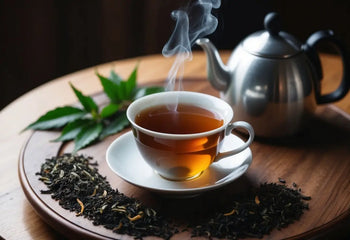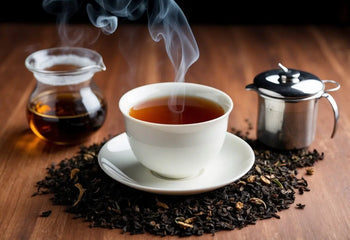How Pu Erh Tea Can Improve Digestion and Gut Health: What Science Says
Shop our premium Pu Erh tea collection—available in both ripe and raw varieties! Exploring the ancient traditions of tea often leads us to remarkable health discoveries. Pu Erh tea, a fermented variety originating from Yunnan, China, has been cherished for centuries not just for its rich, earthy flavor but for its digestive benefits. Research suggests that Pu Erh tea contains unique microorganisms and compounds formed during fermentation that can positively influence gut microbiota, enhance digestion, and reduce bloating. We've seen growing scientific interest in this traditional brew as modern studies examine its effects on digestive enzymes and metabolic health. The...
Raw vs. Ripe Pu Erh Tea: Which One Should You Choose?
Shop our premium Pu Erh tea collection—available in both ripe and raw varieties! Venturing into the world of Pu Erh tea often presents newcomers with a fundamental question: should you choose raw or ripe? These two distinct variations offer completely different experiences, from flavor profiles to brewing methods and even aging potential. The choice between raw and ripe Pu Erh ultimately depends on your personal taste preferences and goals. Raw Pu Erh (sheng) delivers a bright, sometimes astringent profile that transforms beautifully with age, while ripe Pu Erh (shou) offers a smooth, earthy, and immediately approachable cup thanks to its...
How to Brew Gongfu Style Pu Erh Tea: Step-by-Step Guide
Shop our premium Pu Erh tea collection—available in both ripe and raw varieties! Venturing into the world of Pu-erh tea using the Gongfu method transforms an ordinary tea session into a meditative experience connecting you to centuries of Chinese tea culture. Brewing Pu-erh Gongfu style unlocks complex flavors and aromas impossible to achieve with Western brewing methods, allowing you to experience the tea's true character through multiple infusions. We've spent years refining this traditional technique and are excited to share our step-by-step approach that makes this seemingly complicated process accessible to beginners. Many tea enthusiasts are intimidated by Gongfu brewing,...
The Best Pu Erh Tea Storage Solutions: How to Preserve Quality and Flavor
Shop our premium Pu Erh tea collection—available in both ripe and raw varieties! Properly storing Pu-erh tea isn't just about preservation—it's about transformation. This aged tea continues to evolve over time, developing complex flavors that tea enthusiasts cherish. The ideal Pu-erh storage environment maintains 60-70% humidity with stable temperatures between 68-77°F (20-25°C), away from strong odors and direct sunlight. Many tea collectors struggle with finding the right balance in their storage approach. Too dry, and the tea stagnates; too humid, and you risk mold. We've spent years experimenting with different methods, from traditional clay vessels to modern pumidor setups, to...
Recent articles






